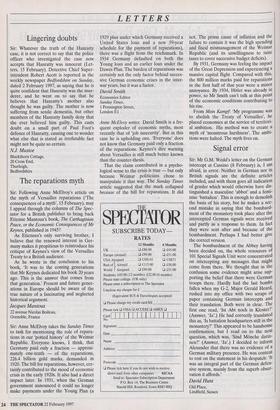Sir: Anne McElvoy takes the Sunday Times to task for
mentioning the role of repara- tions in our 'potted history' of the Weimar Republic. Everyone knows, I think, that Germany paid only a fraction — approxi- mately one-tenth — of the reparations, 226.4 billion gold marks, demanded in 1920. The bill for reparations, however, cer- tainly contributed to the mood of economic crisis in the early 1920s. It also had a direct impact later. In 1931, when the German government announced it could no longer make payments under the Young Plan (a 1929 plan under which Germany received a United States loan and a new 59-year schedule for the payment of reparations), there was a flight from the reichsmark. In 1934 Germany defaulted on both the Young loan and an earlier loan under the Dawes Plan. The burden of reparations was certainly not the only factor behind succes- sive German economic crises in the inter- war years, but it was a factor.
David Smith
Economics Editor
Sunday Times,
1 Pennington Street, London El
Anne McElvoy writes: David Smith is a fre- quent exploder of economic myths, most recently that of 'job insecurity'. But in this case he is upholding one. 'Everyone' does not know that Germany paid only a fraction of the reparations. Keynes's dire warning about Versailles is still much better known than the counter-thesis.
That the claim contributed in a psycho- logical sense to the crisis is true — but only because Weimar politicians chose to manipulate it that way. The Sunday Times article suggested that the mark collapsed because of the bill for reparations. It did not. The prime cause of inflation and the failure to contain it was the high spending and fiscal mismanagement of the Weimar Republic (and its unwillingness to raise taxes to cover successive budget deficits). By 1931, Germany was feeling the impact of the Great Depression and experiencing a massive capital flight. Compared with this, the 800 million marks paid for reparations in the first half of that year were a minor annoyance. By 1934, Hitler was already in power, so Mr Smith can't talk at this point of the economic conditions contributing to his rise.
From Mein Kampf: 'My programme was to abolish the Treaty of Versailles', he placed economics at the service of territori- al ambition. His method was to create a myth of 'monstrous harshness'. The ambi- tions were halted. The myth lives on.


























































 Previous page
Previous page